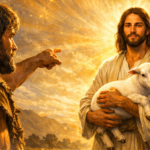
Text: Luke 5:1-11
Theme: “The Cost”[1]
___________________________
Intr – Reading Luke 5, have you ever considered the cost—the sheer amount—that the disciples left behind, right there in front of them, in two boats overflowing with fish?
While preparing for this sermon, I decided to research what the life of fishermen was like back in Jesus’ time.[2] And, if you’re anything like me, sometimes you go down a rabbit hole on the internet—clicking one link, then another, and before you know it, an hour has passed, and you’re wondering, “Wait, where was I?” That was me doing this research. But I found something fascinating that I want to share with you. I hope you find it as compelling as I did.
William and Rochelle Hauser conducted research trying to estimate the amount of fish those two boats could have carried. Their work was based on a reconstructed model of the so-called “Jesus Boat,” a fishing boat discovered by the Sea of Galilee that dates back about 2,000 years—right around the time Jesus and His disciples lived. [3]
Their research involved complex mathematical calculations—most of which I didn’t even try to decipher—but the bottom line is this: they estimated that the capacity of such a boat, fully loaded, would be about 33,000 pounds. Considering the biblical account that the two boats were nearly sinking under the weight of the fish, they estimated that, after subtracting the weight of the people on board, each boat would have been carrying approximately 31,000 pounds of fish. That means the total haul for both boats would have been around 62,000 pounds—or about 87,000 libras, an ancient measurement of the time.[4]
Now, let’s put that into economic terms. In their study, the Hausers attempted to determine the value of this catch in terms of labor wages. They estimated that one denarius—a standard day’s wage—was roughly equivalent to about 100 Canadian dollars today. Their conservative estimate of the value of the fish catch? About 699,000 denarii communes—which, in today’s terms, would be roughly 69 million Canadian dollars.
Maybe that seems too high, so let’s scale it down. If we take only 50% of that amount, that’s still 35 million. Cut it to 10%, and it’s still 6.9 million. Even at just 5%, it’s 3.5 million dollars. Now, imagine someone handing you a check for 3.5 million dollars. Would you walk away from it?
This makes the disciples’ decision incredibly real. What was at stake for them? Jesus had just provided them with an overwhelming miracle—a tangible sign that He was the Messiah. But standing before them was not just a miraculous catch of fish; it was a crossroads, a moment of decision.
Peter, overwhelmed, falls before Jesus and says, “Depart from me, for I am a sinful man, O Lord.” Peter had seen miracles before, but this one hit home because fishing was his livelihood. He had toiled all night and caught nothing. Yet now, at Jesus’ word, his nets were bursting. As an experienced fisherman, he knew—without a doubt—that only the Messiah Himself could have done this.
That was the material cost that Peter and his associates paid to follow Jesus. They left behind the perspective of economic independence.[5] But the Gospel today leads us to the deeper, more important level of the cost of discipleship. The text tells us that “immediately they left everything behind”—the fish, the boats, the nets. They stepped away from a life they understood into a new journey with Jesus—one where they had an idea of where they were going, but no guarantees of security or stability. They left behind not only their possessions but also the certainty of a known trade, to follow a man whom the religious leaders of the time deemed untrustworthy—a carpenter from Nazareth, not the Messiah they were expecting.
As Christians, we need to go deeper than just the material cost of discipleship.
- To know Jesus
The first answer is simple: to know Jesus. The disciples left behind material wealth, but they gained something infinitely more valuable—a personal relationship with their Savior. When you follow Christ, you commit to knowing Him more. Otherwise, things get really hard.
Think about it: after the sermon, we’ll confess the Apostles’ Creed. If someone asked you to explain every item in it—what it means to believe in Jesus, in the Holy Spirit, in the holy Christian church—how prepared would you feel? What if someone asked, “What does Jesus teach about forgiveness? About anxiety, worry, or facing difficulties?” Those questions might make us feel small.
I’m not saying that we need to know everything—this is about continually growing, learning a bit more, connecting a little deeper, returning to the Scriptures. That’s what we want to do: know the Bible, know Jesus, and deepen our relationship with Him. This isn’t just any relationship—it’s a deep, faith-filled connection, so that we know we are walking with Him and that He is guiding us. No matter what temporary pleasures the world offers to distract us, we stay with the ultimate prize: to be with Jesus forever. The cost of discipleship includes taking the time to know Him.
This is what happened to Peter. How could he stand before Jesus—even after witnessing a miracle—and say, “You are the holy one, but stay away from me, for I am a sinful man?” Because he knew the Scriptures; he understood that the Messiah was before him and that this wasn’t some other kind of Messiah. By knowing the Word, Peter could confess, “You are the Messiah; I want to follow you.” The other disciples, through what had been spoken about Him and from their prior encounters, knew Him too. That was the moment they definitely left everything behind to follow. The cost of discipleship involves getting to know Jesus—and that’s a privilege we must never take for granted.
- To trust Jesus
Trusting God sometimes means not knowing the path ahead but knowing that He knows every step. Peter told Jesus, “I toiled all night and caught nothing, but on your word, I will do it.” He placed unconditional trust in the Messiah’s word. That’s what we want to do as we walk with Jesus—trust in His Word, His guidance, and His direction, even when we fail. Trusting isn’t so much about how tightly we hold God’s hand, but about how His grace holds us when we’re weak. Sometimes we are weak, worried, depressed, uncertain, or anxious, and our grip on God’s hand may seem feeble. But remember, He is the one holding your hand first.
He is the one promising to fulfill His promises so that we, as disciples, learn to trust not in man or earthly power but in the Holy One of Israel. We must place our unconditional trust in the truth that whatever He tells us is God’s Word—even when our path changes and temptations arise. We trust that He knows every step, just as it was a huge leap of faith for the disciples to leave behind a known life and step into the unknown.
- Faith active in love
We trust in this man—this guy who many might see as just a random person walking around—but we know He is the Messiah, our Savior, who calls us to act in faith. Our church’s motto is “Active in Love, Growing in Christ.” We talk about growing in Christ—growing in knowing Him, in trusting Him—but we also want to be active in love. Our faith should be evident in our actions toward our neighbor, guided by God’s Word and not by our own hearts, which can sometimes be lost or insecure. That’s why we want our hearts in Jesus: so that as we follow our own hearts, we are really following Him. Our faith becomes active—in prayer, in caring, in connecting, and in all the many ways we can act.
I once heard a psychologist talk about her “five-second rule.” Sometimes we know what we have to do, but we just don’t feel like it. She said there’s a window—a mere five seconds—where she forces herself into action. For example, when she wakes up, she makes sure to get out of bed within five seconds before random thoughts can delay her. Her point is that sometimes you don’t feel like doing the right thing, but you know it’s right, so you act.
This is not the Word of God, but an opinion from a person. But I think we can learn a little from this take. Perhaps our prayer should be, “Lord, give me the strength to do what You call me to do, even when I don’t feel like it.” Sharing the Gospel, living out our faith, or simply bearing witness as Christians can be challenging—whether it’s in our family, at work, or wherever we go. And I am not even talking about things that discomfort you too much, like going around the Church knocking on people’s doors and saying, “Jesus loves you, come to my church” (you can, though, if you want to), or starting an online podcast about truths from the Gospel. It can be small and simple. But when we overcome sin and our feelings, our actions can become steady. It might not always be a five-second decision—it might be a day or two of reflection—but when He calls, we must act. We must let what we know shine through in our lives, just as Jesus did, so that more people may come to know the good news.
We know Jesus. We trust in Him. And we act. Peter declared, “On Your word, I will cast the nets,” and he did. It’s not uncommon for us, too, to know what we must do and then hesitate. But Peter combined trust with action—and that was because Jesus paid the ultimate price.
He left everything behind
Do you know who left behind all the best things ever just to be with us? Jesus. He left the heavens—He, the Son of God—to be by that lake, healing people and providing for them, even when not everyone was willing to listen. He paid the cost of redemption for you. Redemption means being saved from sin and hell and being welcomed into God’s family. As Luther said in his catechism, redemption wasn’t bought with silver or gold, but with His precious blood—so that you know you belong to Him.
Nevertheless, He never regretted it or looked back. He never denied us. Jesus left everything behind to come into the world because He is the Firstborn. He came to fish souls out of the devil’s grasp, to rescue us from the terrors of death, and to place us in the boat of salvation, giving us eternal life.
Jesus left everything behind so that we might have everything. As Jesus made that sacrifice for you, think about the cost of holding back from fully trusting Him. He is calling you to leave behind anything that would keep you from experiencing the fullness of His love.
The reward
We’re talking about the cost of discipleship, but can we talk about the reward too? Of course we can. It’s not as if we’re toiling to earn something; Christ has already given and promised it to us. Our hope isn’t found in what we leave behind—it’s found in what lays ahead. We look forward to life without end. We look forward to opportunities to connect. We look forward with hope because, even though the world may bring wars, problems, and more, we are secure in the hands of the one who fished us to His sea of love. you still walk in hope and in the assuredness that the same Word that told Peter to throw the net is the Word that tells you, “Follow Me.” We look forward; therefore, we leave things behind.
Here’s an important reminder in this connection: We have left things behind and we are following Jesus, like Peter and the disciples did. But this road is not light and straight. Peter, for example, left everything behind, and later on, he denied Jesus. He needed forgiveness and restoration.
As we follow Him, He showers us with His blessings—the forgiveness when we fail, and the promise of eternal life. The same Peter, who left everything behind (worth 69 million dollars, maybe) to follow Him, later denied Him and then was restored by forgiveness. The same holds true for us. Sometimes we promise Jesus that we’ll follow Him and dedicate our lives to Him, only to stumble and fail because we are weak. But His forgiveness is there, along with the blessings He bestows and the crown of eternal life—which is what we truly seek.This is a reminder of human frailty and Jesus’ presence and power. Jesus is there to lead us in overcoming our moments of weakness, and the grace available for restoration offers additional comfort and guidance.
And a beautiful thing that happens when we answer Jesus’ call: we will catch men alive. Did you see that in the text? You might not, because it got lost in the translation. But when you go to the Greek text, you see that Jesus tells Peter he will “catch men alive.” Can you see the beautiful play on words that Jesus is doing here? As fishermen, Peter and the disciples were used to bringing fish from life into death. Now, as fishers of men, they will catch men alive—drawing them out of the death of sin. For this is what the Word does: it kills and makes alive. We will fish people into life in the Kingdom.
Conclusion – Do you remember in John 21—after Jesus was resurrected and before He ascended—He performed another miraculous catch? He told the disciples to cast their nets, and they came back with 153 big fish. What about another 30 slides on that? Just kidding, that’s a topic for another sermon. But just before He went to heaven, Jesus gave them this extraordinary gift of 153 big fish. How much was that worth? We don’t know.
What we know is that the precious gifts he left for us strengthened their faith and our faith, to follow Him, to know him, trust him and act in faith. These, not all currency in the world can match.
Additional resources
CATCHING MEN ALIVE
Confessional Lutheran theologians generally understand Luke 5:1–11 as having both a specific and a general dimension in its call:
- Specific Call to Apostolic Ministry:
In the immediate context, Jesus calls Simon Peter (along with James and John) after a miraculous catch of fish. When Jesus tells them that from now on they will be “fishers of men,” this is seen as a special, apostolic calling. The apostles are commissioned to be the primary witnesses of the Gospel and to have a unique role in proclaiming the Word and establishing the Church. This particular call is understood as setting apart those who would hold the office of ministry, entrusted with teaching, preaching, and shepherding the flock. - General Call to Christian Discipleship and Vocation:
At the same time, confessional Lutheran theology affirms the doctrine of vocation (Berufung), which teaches that every believer is called by God to serve Him in their everyday life. While not every Christian is called to the ordained office of ministry, all Christians share in Christ’s call to follow Him, trust Him, and live out the Gospel in their daily activities. The miraculous catch of fish also symbolizes how Christ works through ordinary people—transforming a routine occupation into a means of participating in His redemptive mission. In this sense, “fishing for men” becomes an image for every Christian’s responsibility to witness to the Gospel in the context of their own life and work. - Integration of Both Aspects:
Confessional Lutheran theologians emphasize that while the call to apostleship (as seen in Luke 5) is a particular office with its own responsibilities, the broader invitation to follow Christ and bear witness is extended to all believers. The passage invites all Christians to respond with the kind of faith and obedience that transforms ordinary life into a platform for God’s work. It teaches that, by trusting in Christ’s promises—even when the outcome seems humanly impossible—believers become active participants in God’s mission, whether through ordained ministry or through the everyday tasks of their vocations.
In Summary
- For Apostles/Pastors: Luke 5:1–11 records a specific call to ministry leadership and apostolic work, designating a special role in proclaiming the Gospel and building the Church.
- For All Christians: The passage also serves as a model of discipleship, showing that every believer is called to follow Christ wholeheartedly and to engage in God’s mission in the world through their daily lives.
Thus, while the text contains a particular commission for those entering the ministry, its underlying message of radical trust in Christ and participation in His mission is a general call to all Christians.
[1] Sources consulted:
Lectionary Kickstart – https://scholar.csl.edu/lks/91/
Nestle Aland, The New Testament Greek Ed 28
[2] Fishing was a lucrative business in those times, offering a decent income. But even on the best of days, a fisherman would never catch such a massive quantity of fish at once. This was truly a miracle.
Income and Taxation – Estimating exact incomes is challenging due to limited historical records. However, some analyses provide insights. For instance, a study estimating the value of two boatloads of fish, as described in Luke 5:1-11, suggests that the catch could be worth between approximately 699,272 to 1,048,908 denarii communes. Given that skilled laborers earned about 50 denarii communes per day and general laborers about 25, this catch would equate to many years’ worth of wages.
It’s important to note that fishermen were subject to significant taxation. They often had to pay a portion of their catch, sometimes up to 25%, as a tax for fishing rights. Additionally, they faced taxes on their boats and equipment, further impacting their net income.
[3] Source: https://www.academia.edu/35395818/An_Estimate_of_the_Value_of_Two_Boatloads_of_Fish_As_Recorded_in_Luke_5_1_11
[4] “In Luke 5:11, it is noted that the disciples “left everything” to follow Jesus. To understand the magnitude of their sacrifice, it’s essential to consider the economic context of first-century Galilean fishermen.
Economic Standing of Fishermen
Fishermen like Peter, Andrew, James, and John were engaged in a trade that, while demanding, provided a livelihood above mere subsistence. They operated in a structured economy where fishing rights were regulated, often requiring licenses obtained through local tax collectors. This system meant that fishermen had to navigate bureaucratic channels and pay for the privilege to fish.”
“To estimate how much the disciples left behind in today’s money, we need to convert denarii communes (a common wage unit of the time) into modern equivalents.
Step 1: Value of a Denarius
- A denarius was roughly a day’s wage for a laborer in the 1st century.
- A modern equivalent for a day’s wage in North America today is around $100 to $150 (based on minimum wage and general labor earnings).
Step 2: Value of the Catch in Luke 5
- Estimates suggest the catch in Luke 5 could be worth 699,272 to 1,048,908 denarii communes.
- If 1 denarius = $100, then:
- 699,272 denarii = $69.9 million
- 1,048,908 denarii = $104.9 million
Step 3: Accounting for Taxation and Long-Term Income
- If fishermen paid 25% in taxes, their net income would still be substantial.
- If their business was sustainable over many years, the lifetime earnings lost would be in the millions of dollars per disciple.
Conclusion
The disciples left behind a business that could be worth tens of millions of dollars in today’s money, based on the miracle catch in Luke 5. Even if that was an extraordinary haul, their fishing business likely provided a middle-to-upper-class income in their society, making their decision to leave it all behind a significant sacrifice.
While precise figures are elusive, it’s evident that the disciples left behind a stable and potentially profitable livelihood. Their decision to abandon their fishing business meant relinquishing not only their primary source of income but also the security and identity associated with their profession. This underscores the depth of their commitment and the significant personal sacrifice involved in following Jesus.”
[5] Jesus paid Peter very well for the use of his boat. The estimated range of pay he and his partners received was enough for them to retire from the fishing business, and work full-time for God. A modern financial adviser says one needs 25 years’ expenses in investments to retire early. The value of the fish at 24.3-36.4 years’ pay for unskilled labor fits well within this range. This also puts a new light on Peter’s reaction to Jesus’ comment in Luke 18:24-25 that it is easier for a camel to go through an eye of a needle than it is for a rich man to be saved. Peter and his partners identified with the rich man at that point, and said in verse 26 and 28, “Who then can be saved?…..We have left all and followed You” Source: https://www.academia.edu/35395818/An_Estimate_of_the_Value_of_Two_Boatloads_of_Fish_As_Recorded_in_Luke_5_1_11







Comments(2)
Pastor Tony K. Thomas says:
October 21, 2025 at 8:33 amThis message is so needed in these days. It is important to get to know Jesus for ourselves by engaging with Him in the reading of the Gospel and Word of God.
This article is a God sent message of fellowship.
We are brothers and sisters in Christ and all are one.
Keep fishing for more souls.
Shalom
Pastor Thomas
lalbrecht says:
October 21, 2025 at 11:25 amThanks for your comments Pastor Thomas. It is good to be gathered together by Christ in the family of God and to learn from His Word!
Blessings in your ministry!
Pastor Lucas